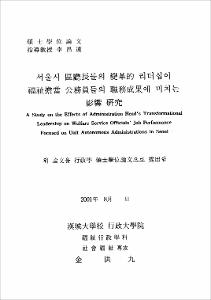서울시 區廳長들이 變革的 리더십이 福祉擔當 公務員들의 職務成果에 미치는 影響 硏究
= (A) study on the effects of administration head's transformational leadership on welfare service officials' job performance : focused on unit autonomous administration in Seoul
- Files in This Item:
-
-
Download
 000000066110.pdf
기타 데이터 / 2.26 MB / Adobe PDF
000000066110.pdf
기타 데이터 / 2.26 MB / Adobe PDF
-
Items in Repository are protected by copyright, with all rights reserved, unless otherwise indicated.